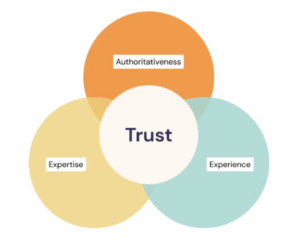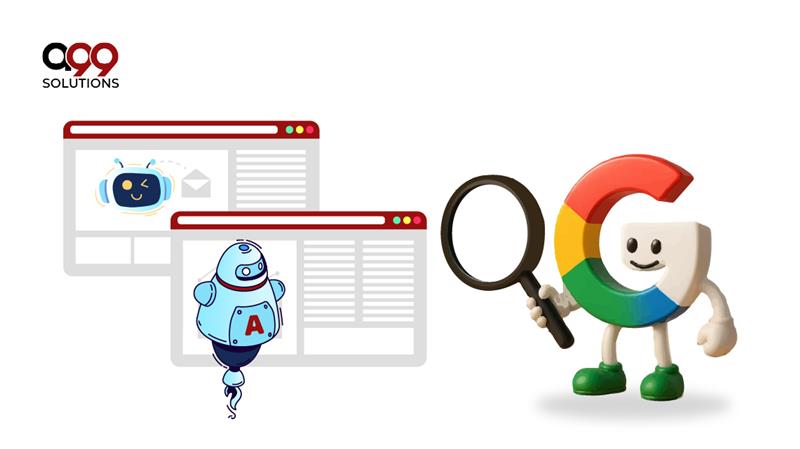Is Google Penalizing AI Content? As artificial intelligence (AI) continues to revise content creation, numerous digital marketers and content generators are questioning how Google perceives AI-generated content. Does it correct similar content? Should AI-generated content be labeled? This comprehensive companion delves into Google’s station on AI content, the current E-E-A-T guidelines, the future of Google’s AI content policy, and best practices to align with Google’s algorithms.
Google’s Stance on AI-Generated Content
Google’s opinion of AI-generated content has evolved with time. Google acknowledges as of 2024 that artificial intelligence can be a precious tool for content creation given applicable operation. Google’s Search Central Blog states, “Our programs aren’t against applicable use of artificial intelligence or robotization. This implies, unlike our anti-spam programs, it isn’t used to induce coffers only for the manipulation of exploration rankings.”
So, is Google penalizing AI content? Not if it’s used appropriately. Google underlines that material should be created first for people rather than for search engines. Content produced specifically for manipulating search rankings or offering no added value could be seen as spam and may be penalized.
Targeting “gauged content abuse,” Google released a major update in March 2024 that resulted in a 45% drop in low-quality, epigonic content shown in hunt results.
Understanding Google’s E-E-A-T Guidelines

Google’s E-E-A-T stands for Experience, Expertise, Authoritativeness, and Trustworthiness. These guidelines are part of Google’s quality ratings and help determine how good content is. While E-E-A-T isn’t a direct ranking factor, it plays a big role in how Google judges content, especially for topics that affect people’s health, finances, or safety, also known as YMYL (Your Money or Your Life) topics.
Here’s a Breakdown of the E-E-A-T Factors
Element | Description |
Experience | This means the person creating the content has real-life experience or knows what they are talking about. |
Expertise | The person is an expert or has deep knowledge in the subject they are writing about. |
Authoritativeness | This means the website or person is well-known and trusted in their field. |
Trustworthiness | The content or website is reliable and you can trust the information it gives. |
The Future of Google’s AI Content Policy
Looking ahead, Google’s use of AI in its search algorithms is expected to grow stronger. CEO Sundar Pichai has highlighted that AI, especially through Google’s Gemini AI, will play a crucial role in shaping the future of search.
As AI becomes more embedded in search, Google’s systems will likely keep evolving, focusing on the importance of high-quality, user-centric content. Content creators must stay updated on these changes to ensure their content remains visible, relevant, and competitive — especially in light of ongoing discussions like “Is Google Penalizing AI Content?”
Best Tips to Align with Google’s Algorithm
1. Focus on People-First Content
Google favors content that’s erected for humans and not for hunt machines. Make sure your content offers real value, responds to stoner intent, and provides different perceptivity. No way make content simply to rank within hunt results.
2. Leveraging Human Insight for Better Content Creation
When using AI tools, it’s crucial to blend them with your personal touch. Infuse your content with real-life experiences, expert knowledge, and unique viewpoints that AI can’t replicate. This strategy aligns with the “Experience” and “Expertise” aspects of E-E-A-T, ensuring your content stands out with authenticity and authority — an important consideration given ongoing questions like “Is Google Penalizing AI Content?”
3. Stay Streamlined with SEO and Content Trends
The online world is always changing. Stay updated on the latest Google algorithm updates, SEO rules, and content trends. By doing this, you can adjust your strategies and keep your content relevant and effective.
4. Use AI Content Responsibly
Although AI can compound content creation, it should be used responsibly. Make sure AI-generated content is checked and edited by humans to insure quality and delicacy. Avoid relying entirely on AI for content creation, especially for topics that require deep expertise or unique insights.
Conclusion
Google doesn’t innately correct AI-generated content. Still, content that lacks originality, is created solely for SEO manipulation, or fails to give value to users may be subject to penalties. By focusing on people-first content, demonstrating human expertise, staying informed about SEO trends, and using AI responsibly, content creators can align with Google’s guidelines. A99 Solutions helps businesses strike that perfect balance—delivering high-quality, AI-assisted content that ranks and resonates in today’s evolving digital landscape.




